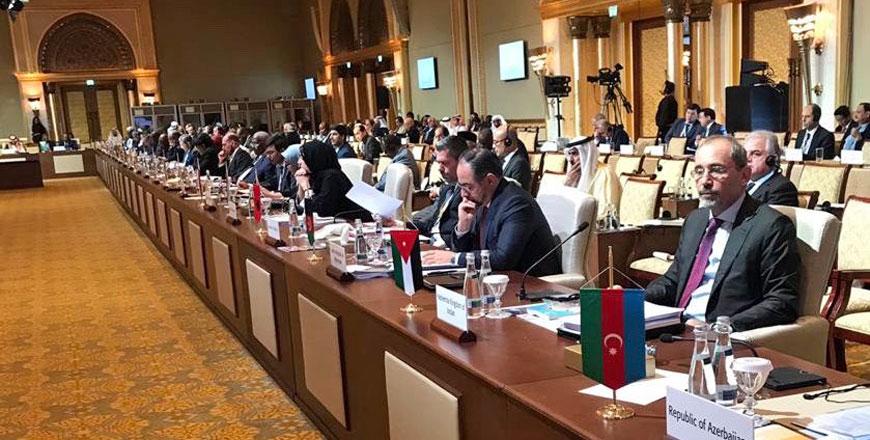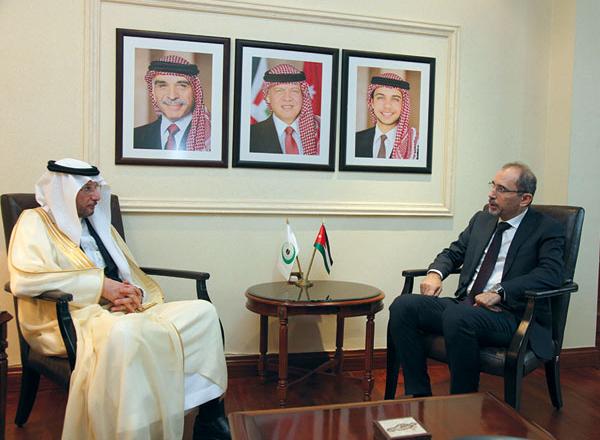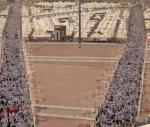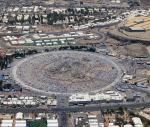You are here
Kingdom exerts all its might to safeguard Jerusalem holy sites — Safadi
By JT - Mar 02,2019 - Last updated at Mar 02,2019

Foreign Minister Ayman Safadi participates in the 46th session of the Organisation of Islamic Cooperation's Council of Foreign Ministers in Abu Dhabi, the UAE, on Saturday (Photo courtesy of Foreign Ministry)
AMMAN — The Hashemite Custodianship over Islamic and Christian holy sites in Jerusalem is a mandate that the Kingdom fulfils with all its might, Foreign Minister Ayman Safadi said on Saturday.
During the UAE-hosted 46th session of the Organisation of Islamic Cooperation's (OIC) Council of Foreign Ministers (CFM), Safadi added that safeguarding the Islamic and Christian holy sites in Jerusalem and preserving the city’s Arab and Islamic identity is a top priority for its guardian, His Majesty King Abdullah, a Foreign Ministry statement said.
Liberating Jerusalem as a capital for the independent Palestinian state along the lines of June 4, 1967, in accordance with the resolutions of international legitimacy and the Arab Peace Initiative, is the only path to resolving the Israeli-Palestinian conflict and achieving security, stability and comprehensive peace, he said.
During an address delivered in the conference, Safadi stressed the importance of establishing the endowment fund of the Palestine refugees to mobilise the financial needs for the UNRWA and enable it to perform its role of supporting the Palestinian refugees.
During the two-day conference that concluded on Saturday, Safadi said that the Syrian crisis is a "bleeding wound" that has caused suffering and destruction that must be ended through a political solution that would restore Syria's security and stability, preserve its unity and allow the voluntary return of refugees to their homeland.
He also underlined that the Kingdom hosts 1.3 million refugees, noting that the international community must bear its responsibility towards the refugees as well as Jordan and other host countries.
The conference needs to transmit a clear message reiterating the necessity of Houthi’s commitment to the Stockholm agreement as a key step towards a political solution restoring Yemen’s stability, referring as well to the need for resolving the Libyan crisis, Safadi added.
Safadi noted the necessity of launching a systematic institutional action to face the phenomenon of Islamophobia, along with enhancing efforts to counter the distortion of the image of Islam.
He also shed light on the issue of the Rohingya Muslim minority in Myanmar’s Rakhine state, stressing the need for exerting more efforts to protect them and facilitate their return to their home country, along with supporting the communities hosting them and holding those who are responsible for the violations committed against them accountable.
The top official thanked the UAE for hosting the conference and its hospitality, congratulating the UAE’s Minister of Foreign Affairs and International Cooperation Sheikh Abdullah Bin Zayed Al Nahyan on the chairmanship of the OIC’s CFM session.
The council renewed at the end of its session its rejection of Israel’s overstepping of the Hashemite Custodianship over Jerusalem, commending Jordan and the Jerusalem Awqaf Department for their stance on Bab Al Rahmah (Gate of Mercy) of Al Aqsa Mosque complex, and their efforts to keep the building open for worshippers, the Jordan News Agency, Petra, reported.
On the conference’s sidelines, Safadi and his Emirati counterpart discussed means of enhancing cooperation and bolstering brotherly ties between the two countries, which are witnessing continued development in all fields.
Safadi acquainted Sheikh Abdullah with the outcomes of the London initiative, which was held on Thursday in the UK capital to support the Jordanian economy, thanking the UAE for taking part in the conference and valuing its supporting stances.
Sheikh Abdullah underlined the UAE’s strategic relationship with Jordan, expressing his country’s keenness to develop economic and investment cooperation with the Kingdom.
Also on the conference’s sidelines, the foreign minister held meetings with his Kazakhstani and Kosovan counterparts over widening scopes of cooperation.
Safadi and Kazakhstani Minister of Foreign Affairs Beibut Atamkulov discussed the efforts aimed at reaching a political solution for the Syrian crisis as Astana hosts Syria peace talks in which Jordan is taking part as an observer.
During his meeting with Kosovo’s Foreign Minister Behgjet Pacolli, Safadi went over means of enhancing bilateral cooperation, with Pacolli commending the Kingdom’s support for his country, according to the statement.
Also on Saturday, Safadi met with UNRWA Commissioner General Pierre Krahenbuhl on the sidelines of the Abu Dhabi meetings.
Safadi and Krahenbuhl reviewed steps taken by Jordan and UNRWA, along with the international community, to secure funding to offset the UNRWA budget deficit and warned of the serious consequences of the agency’s inability to provide vital services to Palestinian refugees in its areas of operations.
In a separate meeting, Safadi and his Maldivian counterpart Abdulla Shahid discussed bilateral relations and boosting cooperation between the two countries.
The top diplomats underscored their countries’ mutual interest in exploring prospects for economic, trade and tourism cooperation and reviewed regional developments, stressing the need for more coordination on issues of mutual concern within the OIC framework.
Related Articles
AMMAN — Foreign Minister Ayman Safadi on Monday stressed the importance of supporting UNRWA by the international community and providing the
AMMAN — Jordan and the Organisation of Islamic Cooperation (OIC) on Sunday stressed the importance of activating efforts aimed at combating
AMMAN — Jordan rejects and condemns any Israeli measures that aim to impose new facts on the ground, including settlement-building and expan
















